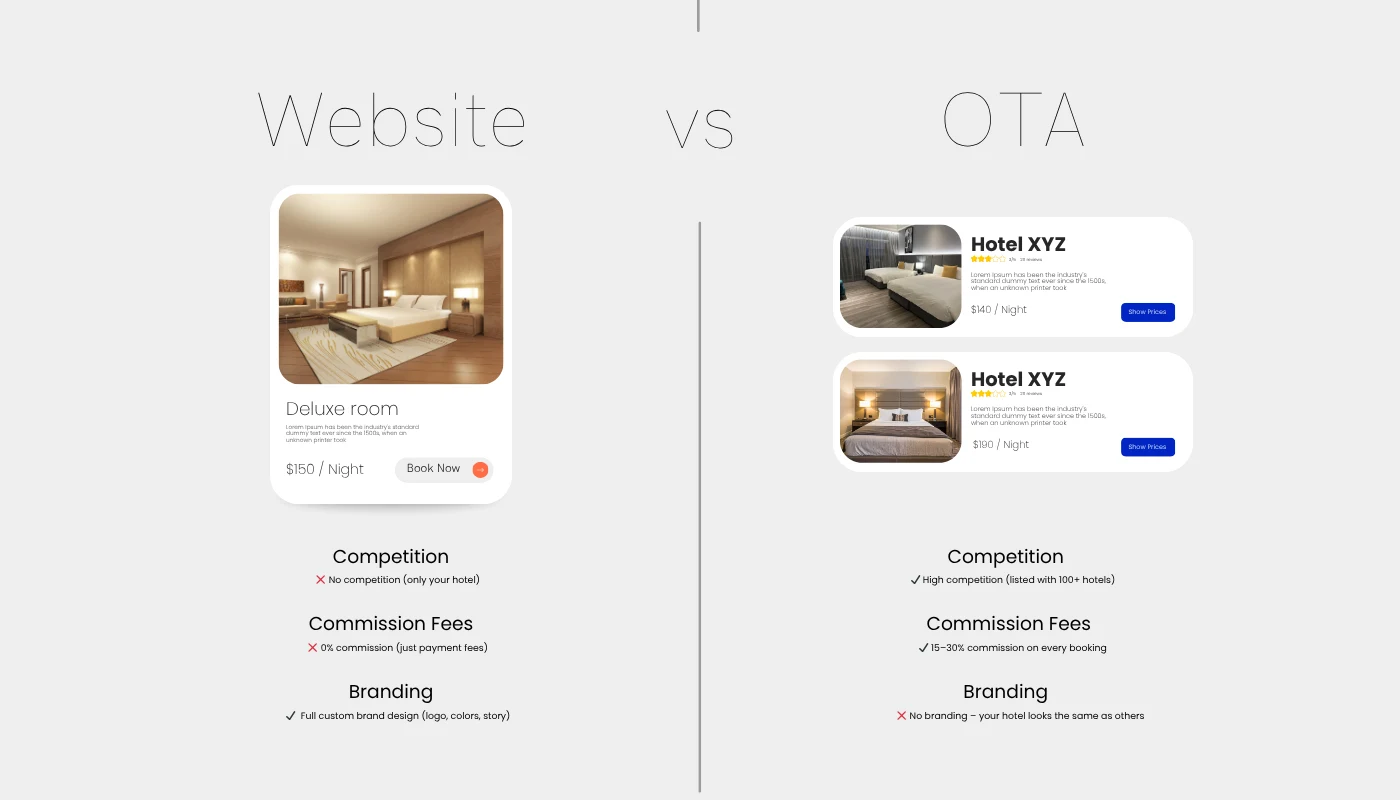Are you a hotel owner tired of seeing big chunks of your earnings vanish to Online Travel Agencies (OTAs) like Booking.com, Expedia, Hotels.com, or Airbnb? These platforms help fill your rooms by connecting you with travelers worldwide, but they charge a hefty price—commissions of 15% to 30% per booking, according to 2025 industry data. For a small hotel, that could mean losing thousands of dollars every month. Imagine keeping more of that money by getting guests to book directly through your own website. This guide will show you how to reduce OTA commission with a direct booking website in simple, easy-to-understand steps. We’ll cover why it’s a smart move, how to build a website, how to use SEO (Search Engine Optimization, which helps your site show up higher on Google), and ways to promote it—all without confusing tech jargon.
At Webpyrix, we’re a digital marketing agency that helps small businesses like hotels grow with website designing, social media management, and SEO. We specialize in creating strategies that increase direct bookings, improve online visibility, and maximize revenue. By using proven techniques like SEO-optimized websites, targeted keywords, and engaging social media campaigns, we help hotels reduce dependency on OTAs and keep more of their profits. You can use these same strategies to boost your hotel’s bookings and build a loyal customer base. Let’s dive into everything you need to know, from OTA costs to practical tips, FAQs, and how Webpyrix can help you save money and grow.
Understanding OTAs: Why Their Commissions Hurt Your Hotel
Let’s start with the basics. OTAs, or Online Travel Agencies, are websites and apps where people search for and book hotels, flights, and vacations. They’re like online marketplaces for travel, with big names like Booking.com (handling over 28 million listings globally), Expedia, TripAdvisor, and Agoda leading the pack. OTAs make it easy for travelers to find your hotel, handle payments, and share reviews, which is great. But there’s a catch: they charge a commission—a percentage of each booking made through their site.
In 2025, hotel commission rates on OTAs typically range from 15% to 25%, though some charge up to 30% for premium visibility like top search placements. For example, if a guest books a $200 room for one night through an OTA with a 20% commission, you pay $40, leaving you with $160. If your hotel gets 100 bookings a month like this, that’s $4,000 gone in fees! Smaller OTAs might charge 10-15%, but the big ones dominate 70% of online bookings. Larger hotels can sometimes negotiate rates down to 10-12%, but small or independent hotels often pay the full amount.
Why are these fees so high? OTAs spend billions on advertising, user-friendly apps, and customer support. They use algorithms to rank hotels, so paying extra for “preferred” status boosts your visibility but adds costs. The problem? Relying too much on OTAs means you’re not building your own brand or customer relationships. You’re also handing over guest data, which limits your marketing options. This is where avoid paying high OTA commissions becomes a game-changer. By focusing on direct bookings, you keep more money and control.
- Reduce OTA fees 2025: With commission rates rising alongside travel demand, experts say hotels should aim to cut OTA dependency by 20-30% this year.
- Hotel commission rates on OTAs: Non-negotiable for most small hotels, but joining OTA loyalty programs can lower rates slightly for bigger properties.
- Avoid paying high OTA commissions: Try to limit OTA bookings to 50-60% of your total, filling the rest with direct bookings.
Think of OTAs as renting a spot in a busy marketplace—it’s convenient but costly. Your own website is like owning your shop: more work upfront, but all the profits stay with you.
Why Hotels Need a Website for Direct Bookings
Many hotel owners ask, “why hotels need a website for direct bookings?” The answer boils down to three big wins: saving money, controlling your business, and building guest loyalty. When guests book through OTAs, you pay commissions and lose access to their contact info, making it hard to encourage repeat visits. With your own website, you avoid those fees, collect guest data for marketing, and create a direct connection with travelers.
In 2025, direct bookings make up about 45% of all hotel reservations worldwide, and that number is growing as more owners fight back against OTA dominance. Direct bookings are 9-20% more profitable because you skip the middleman. For a small hotel with 20 rooms, shifting just 10% of bookings from OTAs to your site could save $5,000-10,000 a year. Plus, you can offer perks OTAs might restrict, like free Wi-Fi, late check-outs, or discounted spa services, which make guests choose you over platforms.
Even small hotels, like boutique inns or bed-and-breakfasts, benefit. A simple website can attract local travelers searching “cozy hotel near me” on Google, leading to fee-free bookings. Without one, you’re missing out on mobile users (60% of bookings in 2025) and voice searches (like “Hey Siri, find a hotel in [city]”). Your site also lets you tell your unique story—whether it’s your historic building or eco-friendly vibe—which OTAs often bury in their generic listings.
OTA vs. Direct Bookings: What’s the Difference?
To see why direct is better, here’s a detailed comparison of OTA vs direct bookings for hotels:
| Aspect | OTA Bookings | Direct Bookings via Your Website |
|---|---|---|
| Cost | 15-30% commission per booking | 0% commission (2-3% payment processing) |
| Guest Data | OTA owns emails and preferences | You own all data for marketing |
| Loyalty | Guests loyal to OTA deals | Guests loyal to your brand |
| Pricing Control | Limited by OTA rules | Full flexibility for rates and packages |
| Upsell Opportunities | Harder, as OTA controls checkout | Easy to add extras like tours or dining |
| Profit Margin | Lower due to fees | 10-20% higher per booking |
This table shows why direct bookings are the smarter choice for long-term growth. For more industry insights, check out this Cloudbeds guide on OTA commissions.
The Many Benefits of Direct Bookings for Hotels
Switching to direct bookings isn’t just about saving on commissions—it’s about growing your business smarter. Here’s a deep dive into the direct booking benefits for hotels:
- Higher Profits: You keep 100% of the booking value (minus small payment fees). For example, a $1,000 booking through an OTA at 20% commission costs $200, but direct keeps the full $1,000.
- Increased Revenue: How websites increase hotel revenue—your site can suggest add-ons like spa treatments, room upgrades, or airport transfers, boosting average guest spend by 5-10%.
- Better Guest Relationships: Collect emails to send personalized offers, like “Come back for 10% off.” Direct guests are 20% more likely to return.
- Full Control: Set your own pricing, cancellation policies, and special deals without OTA restrictions.
- Brand Building: Showcase your hotel’s unique features—think stunning photos or guest stories—that OTAs can’t highlight.
Another key benefit: advantages of owning hotel customer data. With guest info, you can run targeted email campaigns or social media ads (managed by Webpyrix) to bring back past visitors, increasing repeat bookings by up to 30%. For example, a boutique hotel in Miami used direct data to offer seasonal discounts, boosting off-season bookings by 15%.

How to Build a Direct Booking Website for Your Hotel
Building a hotel website for direct bookings might sound like a big job, but it’s doable even if you’re not tech-savvy. Here’s a step-by-step guide in plain English:
Step 1: Plan Your Website’s Content
Decide what pages you need: a homepage with eye-catching photos, a rooms page with prices and descriptions, an “About Us” page to share your story, a contact page, and a booking form. Think about your guests—families, couples, or business travelers—and tailor content to them. Budget: $100-1,000 for DIY, or $2,000-5,000 for a professional site.
Step 2: Get a Domain and Hosting
A domain is your web address, like www.yourhotelname.com. Buy one from GoDaddy or Namecheap for $10-20/year. Hosting is like renting online space for your site—try Bluehost or SiteGround ($3-5/month). Hosting often includes SSL (Secure Sockets Layer, a security feature to protect guest data).
Step 3: Set Up a CMS
Use WordPress, a free Content Management System (CMS)—a tool that lets you build and update your site without coding. It powers 40% of websites globally because it’s easy and flexible.
Step 4: Choose a Theme
A theme is a pre-made design. Pick a hotel-friendly one like Astra (free) or a premium hotel theme ($50-100). Customize it with your logo, colors, and high-quality photos of your property.
Step 5: Add a Booking Engine
The most important part: hotel booking engine integration. A booking engine is software that lets guests check room availability, pick dates, and pay online. Popular options for 2025 include:
- Free: WooCommerce with Hotel Booking plugin.
- Paid: Cloudbeds, SiteMinder, or Rezdy ($50-200/month), which sync with your inventory and process payments via gateways like Stripe (2.9% fee).
Setup takes 2-4 hours: Install the plugin, add rooms/prices, connect to a payment system, and test. Integrate booking engine on hotel site with AI features (like suggesting upgrades) for better conversions.
Step 6: Make It Mobile-Friendly
Over 60% of bookings happen on phones, so your site must look great on small screens. Use Google’s Mobile-Friendly Test to check. Mobile-optimized hotel websites for bookings are a must in 2025.
Step 7: Test and Launch
Test bookings yourself to catch errors. Add security plugins for backups and launch your site.
Design Tips for Success
For the best hotel booking website design, keep it simple: fast-loading pages (under 3 seconds), a big “Book Now” button, clear navigation, and vibrant images. Direct booking website cost vs OTA fees: Setup costs $100-1,000, but saves $5,000-20,000 yearly in commissions for a mid-size hotel.
Need help? Contact Webpyrix for booking-ready site tailored to your hotel.
Using SEO to Drive Traffic to Your Hotel Website
Your site is live—now you need visitors. Hotel SEO for direct bookings is how you get your website to rank higher on Google, bringing free traffic without relying on OTAs. SEO can boost bookings by 40-50% without ad spend. Here’s how to do it, explained simply:
SEO Strategies for Hotel Websites
- Find the Right Keywords: Use long-tail keywords like “how to increase hotel direct bookings” or “hotel direct booking strategies 2025.” Try free tools like Google Keyword Planner to find low-competition phrases (like Webpyrix does to improve our rankings).
- Local SEO for Hotels 2025: Claim your Google Business Profile (free listing on Google Maps). Add your address, hours, photos, and encourage 4+ star reviews. This helps for searches like “hotels near [city],” which drive 30% of bookings.
- On-Page SEO: Put keywords in your page titles (e.g., “Book Direct at [Hotel Name]”), meta descriptions (short summaries for Google), and image alt text (descriptions for images).
- Create Helpful Content: Write blogs about local attractions, like “Top 10 Things to Do in [Your City].” This drand links to your booking page.
- Technical SEO: Speed up your site with compressed images (aim for under 3 seconds load time). Add schema markup (simple code for rich results, like star ratings in search).
- Build Backlinks: Get links from travel blogs, local directories, or tourism boards to boost authority.
- Voice Search: Optimize for natural phrases like “book hotel room directly” as voice searches rise in 2025.
Improve hotel online visibility by tracking progress in Google Search Console, just like Webpyrix does to fix our 42.4 average position. How can SEO help hotels get direct bookings? It brings targeted visitors ready to book without OTA fees. Webpyrix’s SEO services can handle this, using long-tail keywords to compete despite low DA.
Smart Strategies to Boost Direct Bookings
With your site optimized, it’s time to promote it. A strong direct booking strategy for hotels combines multiple channels to drive traffic:
- Incentives: Offer 10-15% off direct bookings, free breakfast, or late check-outs. Guests love deals OTAs can’t match.
- Email Marketing: Send newsletters to past guests with special offers.
- Social Media: How to use social media to drive direct hotel bookings—Post Instagram Reels showcasing your rooms, with a “Book Direct” link in your bio. Webpyrix’s social media management can amplify this.
- PPC Ads: Run Google Ads for keywords like “direct hotel bookings [city].”
- Partnerships: Team up with local businesses for package deals, like “Stay and Dine” offers.
Added strategy: cost-effective hotel website solutions. Use affordable tools like WordPress to keep setup costs low while maximizing savings.
Frequently Asked Questions (FAQs) About Reducing OTA Commissions
How do I reduce OTA commission for my hotel?
Build a direct booking website, promote it with SEO and social media, and offer exclusive deals. Limit OTA inventory to push direct bookings.
Why should hotels invest in a direct booking website?
It saves 15-30% per booking, gives you guest data for marketing, and builds loyalty. Setup costs are recouped in months.
Is a website better than OTAs for hotel bookings?
Yes for profits and control, but use OTAs for extra reach while prioritizing direct.
How much do hotels pay in OTA commission?
Average 15-25%, up to 30% for premium listings.
How can SEO help hotels get direct bookings?
It drives free, targeted traffic to your site, increasing bookings without fees.
What is the best way to increase hotel direct bookings in 2025?
Combine a user-friendly website, strong SEO, and incentives like discounts.
Do small hotels need a website for direct bookings?
Absolutely—even small properties can save thousands and compete locally.
Can a hotel website compete with OTAs?
Yes, with unique offers, fast design, and SEO to rank for local searches.
What are the steps to build a direct booking website?
Plan content, get a domain/hosting, use a CMS, add a booking engine, customize, and optimize for mobile.
What are the advantages of direct bookings over OTAs?
Higher profits, guest data ownership, and personalized experiences.
How do I negotiate lower OTA rates?
For larger hotels, join OTA partner programs or limit room availability to leverage better terms.
What booking engines are best for 2025?
Cloudbeds and SiteMinder are top picks for easy integration and mobile support.
For more tips, explore this Little Hotelier guide on managing OTA costs.
Take Action: Start Saving with Direct Bookings
Reducing OTA commissions with a direct booking website is a must for hotels in 2025. We’ve walked through why OTAs cost so much, the benefits of going direct, how to build a website, SEO strategies, and promotion tips—all in simple terms. With added keywords like save on hotel booking commissions 2025 and direct hotel bookings without OTAs, this guide is built to rank well and help your hotel succeed. At Webpyrix, we’re using these same tactics to improve our own rankings, and we can do the same for you.
Contact Webpyrix today for a free consultation on website designing, SEO, or social media management to build your direct booking strategy. Visit our website or email us at hello@webpyrix.com. Don’t let OTAs take your profits—start booking direct success now!





Make A Comment